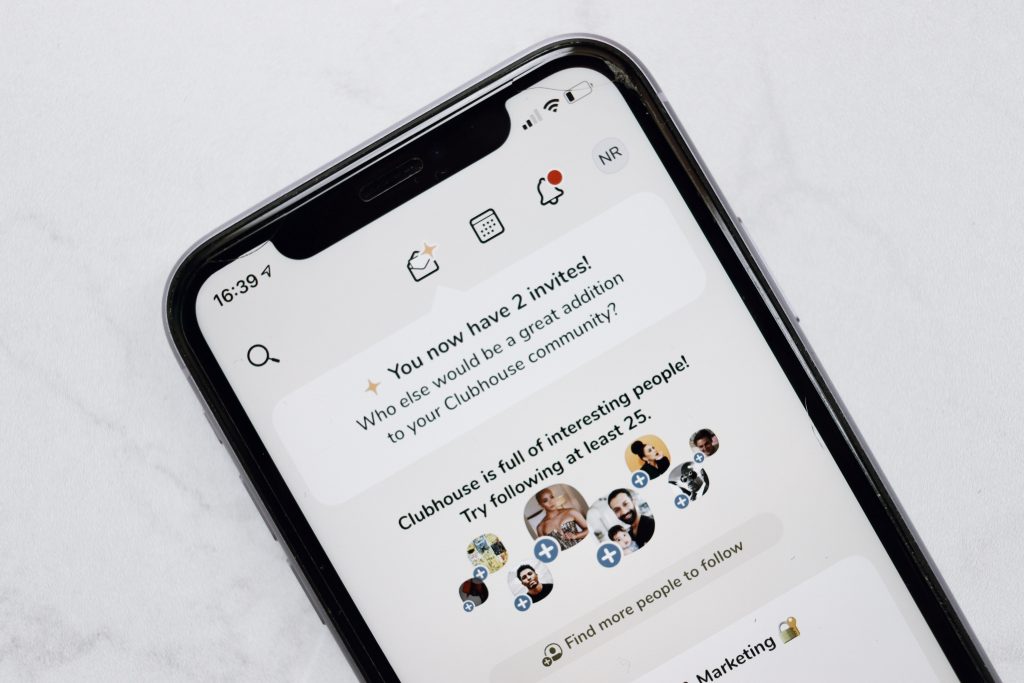The newest entry to the social media scene is Clubhouse, an invitation-only platform built around a “drop-in audio chat” model. Call it an audio chat social network. Users download the platform app and drop into real time, voice only chat room conversations that they may participate in or decide to just sit back and listen to. Or one might request to “own” a room, choose a format and topic and invite folks to drop in and chat. Clubhouse conversations are ephemeral — when the chatting stops, what was said disappears forever. Nothing is recorded.
The brainchild of Paul Davison and Rohan Seth, Clubhouse started with $12M from venture capital firm Andreessen Horowitz. The platform officially launched in the first quarter of 2020, attracting about two million high-profile member users.
The app can only be downloaded on an iPhone, at least for now. Android downloads will be available soon. The service is not optimized for iPad.

The velvet rope
You have to know someone to get in. Clubhouse is a gated community. Access is available by personal invitation only. Members can invite just two people to join, but will earn more invitation credits as they use the app.
Any iPhone user can download the app and reserve a username, but they will be placed on the waiting list. It is allegedly possible that a current member could be notified that someone they know would like to join and would appreciate an invitation. Otherwise, aspiring members who lack the right connections will twist in the wind.
Clubhouse has quickly built up considerable social cachet, most likely the result of its invite-only business model. Having the app on your phone is like getting into Studio 54, the 1970s Manhattan disco where everybody who was anybody went to party hard. The platform has become the darling of A-List entertainers and the tech entrepreneur crowd. Oprah Winfrey, Elon Musk, R & B superstar Drake, Chris Rock and Mark Cuban are members.
Another factor that may enhance its popularity is that Clubhouse users speak to each another in real time. People can talk and it all feels more intimate than other forms of online conversation. People tend to prefer the natural rhythms of speaking we use when talking face-to-face, rather than typing back and forth on a keyboard.
How does Clubhouse work?
Members can follow other members or topics of interest, as they do on other social media platforms. They can also join themed “clubs.” They have access to a selection of chat rooms focusing on different subjects, many of which are attuned to what is trending.
Some rooms will have just a few people chatting informally. Others might contain hundreds or even thousands of people listening to a panel of experts discuss a national or international issue, or a top-selling author or a well-known entrepreneur. If someone in the room would like to contribute to the conversation or ask a question, they “raise their hand” and the room’s “owner” can give speaking privileges.
Required profile photos identify each chat room visitor. Those in the room can browse the profiles of others in the room, including a list of who everyone follows. The Clubhouse algorithm takes all this into account when offering content choices to members.
Why you want in
Clubhouse members can hear, and even participate in, the often relaxed and sometimes very candid conversations of famous and powerful people. You may hear a political debate, a comedy routine, a book club discussion or billionaires talking business. Uber-famous music producer and performer Kanye West expressed interest in hosting a Clubhouse chat room. Mark Zuckerberg and Elon Musk have already used it.
But what will being there do for your business? It depends on the ecosystem in which you operate. If you feel that prospective clients will be impressed when you casually name-drop a celebrity or some other high roller, then consult your Rolodex and devise a strategy to get past the door man.
Audio chats are the future
Imitation is the sincerest form of flattery, and Clubhouse will soon face direct competitors. Facebook recently announced they’re beginning to experiment with social audio features. That’s a testament to the rising appeal of audio social networking platforms.
Entrepreneur and venture capitalist Mark Cuban, a Clubhouse member, has announced he plans to launch an audio-focused social platform called Fireside this year to compete with Clubhouse.
Twitter added a voice feature for tweeting in June 2020. According to the company, they intend to launch a separate audio chat-room product called Spaces. LinkedIn was ahead of the curve on the chat trend when it added voice messaging in July 2018. With all these voice-only platforms joining the fray, it may be time to work on your broadcasting voice.
Thanks for reading,
Kim Clark






Add Comment